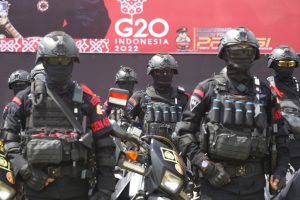Russian President Vladimir Putin may not be attending, but the economic and strategic fallout from his invasion of Ukraine is likely to darken this week’s Group of 20 (G-20) summit, which opens tomorrow in Bali, Indonesia.
The official agenda for the gathering will focus on health, sustainable energy, and digital transformation, but despite the best efforts of host Indonesia, these threaten to be sidelined by several pressing international crises, including the Russia-Ukraine war and growing U.S.-China tensions.
Last week, the Russian government announced that Putin would not be attending the summit, despite a standing invitation from his Indonesian counterpart Joko “Jokowi” Widodo. This is something that can’t have failed to come as a relief to the Indonesian government, given the possibility that some Western leaders might have boycotted the summit if Putin attended it.
But the war has exercised an almost magnetic influence on the course of Indonesia’s G-20 presidency, wrenching the summit’s focus onto the questions of food and energy security, and deepening global strategic fault lines.
In particular, as The Associated Press reported, a key question hanging over the Bali summit is whether Russia will agree to extend the United Nations Black Sea Grain Initiative, which is up for renewal on November 19. Speaking to reporters on the sidelines of the weekend’s Association of Southeast Asian Nations (ASEAN) Summit, Ukrainian Foreign Minister Dmytro Kuleba called for more pressure on Russia to extend the deal, saying Moscow must “stop playing hunger games with the world.”
Since the invasion in February, Indonesia has struggled to maintain the summit’s economic focus. It has faced intense pressure from Western countries to disinvite Russia from the leaders’ summit and even to expel it from the grouping altogether. In an interview with The New York Times published this week, Jokowi, described the coming G-20 summit as perhaps the “most difficult” one yet, given the global political climate.
While holding firm on the question of Russia’s attendance, Jokowi, not a leader known for taking a strong interest in foreign affairs, compensated by undertaking a “peace mission” to Kyiv and Moscow earlier this year in which he offered to mediate the conflict and sought to secure supplies of grain from conflict-torn eastern Ukraine. He has also invited Ukrainian President Volodymyr Zelenskyy to appear at the summit, despite Ukraine not being a member of the G-20. Zelenskyy is expected to address the summit by video link.
The summit also threatens to be overshadowed by growing U.S.-China tensions, which have frayed over Taiwan, maritime disputes in the East and South China seas, and a host of other economic and security issues.
Even as the ASEAN leaders met over the weekend in Phnom Penh, U.S. naval exercises with its partners in the so-called “Quad” group of nations – Australia, India, and Japan — were underway east of Taiwan. On Saturday, meanwhile, China’s military flew 36 fighter jets and bombers near Taiwan, ten of which flew across the median line in the Taiwan Strait that separates the island from the mainland, The AP reported.
On Monday, U.S. President Joe Biden and Chinese leader Xi Jinping are scheduled to hold their first in-person meeting since Biden became president in January 2021.
National Security Advisor Jake Sullivan told reporters that Biden would make clear to Xi that “the United States is prepared for stiff competition with China but does not seek conflict, does not seek confrontation; wants to make sure that we manage that competition responsibly and that all countries, including the United States and the PRC, should operate according to a set of well-established, agreed rules, including on freedom of navigation, on a level playing field for economics, and on refraining from the use of intimidation or coercion or aggression.” Sullivan said that Biden conveyed a similar message at the East Asia Summit in Phnom Penh yesterday.
The G-20, like the Asia-Pacific Economic Cooperation (APEC), the annual summit of which will be held in Bangkok on November 18-19, is in many ways a creature of a past age: the optimistic age of rampant globalization and growing economic and political convergence that followed the end of the Cold War. With the return of great power tensions and the closing of the post-Cold War parenthesis, even the beginning of a new cold war between China and the U.S., it remains to be seen what the future of the G-20 will be.
For now, Indonesia will certainly seek a middle way, attempting to keep the focus on its old mission of mutually beneficial economic interaction. Speaking on Sunday at the closing ceremony of the ASEAN Summit in Phnom Penh, as he took over the bloc’s rotating chairmanship from Cambodia, Jokowi vowed not to let Southeast Asia become the front lines of a new Cold War between the U.S. and China.
“ASEAN must become a peaceful region and anchor for global stability, consistently uphold international law, and not be a proxy to any powers,” he said. “ASEAN should not let the current geopolitical dynamic turn into a new Cold War in our region.”
While the U.S. and China have soured on old-style globalizations, it remains very much in demand among the leaders of Southeast Asia.

































